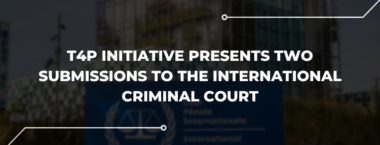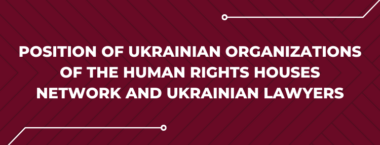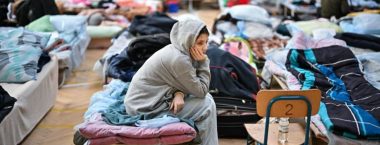
Torments, Torture Chambers, Executions: T4P Initiative Presents Two Submissions to the International Criminal Court
Information about extrajudicial executions of Ukrainians by the Russian military and Russian torture chambers in...
28 September 2023
The Ukrainian Helsinki Human Rights Union has conducted local training sessions of the Ukraine-wide educational and practical course “School as a Territory of Human Rights”. The events took place within the framework of the Ukraine-wide Educational Program “We Understand Human Rights” and with the support of the United States Agency for International Development (USAID) within the framework of the Human Rights in Action project.
Local training sessions were held on May 24-25 in Nova Kakhovka, Kherson Oblast; on May 27-28 in Kamianske, Dnipropetrovsk Oblast; on May 31 – June 1 in Drohobych, Lviv Oblast; on June 5-6 in the Kolychivka Village, Chernihiv Oblast; on June 9-10 in Shepetivka, Khmelnytskyi Oblast, and on June 15-16 in Novovolynsk, Volyn Oblast. These training sessions continued the events for the participants in the training course “School as a Territory of Human Rights”, which began in March 2017 at the Educational Human Rights House – Chernihiv.
The educational and practical “School as a Territory of Human Rights” provides an opportunity to begin active work in order to create an atmosphere of respect for human rights in educational institutions, to implement school-based policies in accordance with human rights standards, to improve decision-making procedures, to build effective school self-governance, to professionally teach special courses, to find like-minded people and to become part of the team “School as a Territory of Human Rights”.
The participants of the training sessions were the teams of 6 educational institutions:
The training sessions were attended by students, parents, teachers, school administrations, as well as representatives of local communities.
The work during the training sessions was intensive and productive. During two days in each educational institution that participated in the training, they worked on creating an atmosphere of respect for human rights through familiarization with its concept. The participants figured out when a person gets a choice in the life; how human rights and choice are related; how the possibility of choosing in an educational institution is implemented by all participants in the educational process; how to take advantage of the right to participate and much more.
Summing up the training, the participants drew attention to the fact that they first worked in the format, when all participants of the educational process interact in such a way. Adults, namely teachers, noticed that they looked at their students differently, seeing them as adults and equal participants. Participants said that, unfortunately, the system of school management at all levels is not always based on human rights principles, and is often authoritarian in nature. Similar events, at least at the school level, give an impetus to change this situation.
Also, most participants noted that their views on the system of self-governance that can exist in educational institutions changed radically. Earlier, their understanding of school self-government was based on the Soviet model. Why is there no developed system of self-governance in educational institutions? There is probably a lack of awareness as to how it can be; what it gives to participants in the educational process; that the self-government cannot depend on the governing bodies of the educational institution, and to be subordinated to the department of education, which seeks to receive reports on the actions taken by the self-government bodies. Also, attention was drawn to the fact that other educational events are needed, which not only inform but also give the opportunity through the simulation process to gain experience, namely, to develop civil competencies.
The events are organized within the framework of the USAID Human Rights in Action Program, which is implemented by the Ukrainian Helsinki Human Rights Union within the framework of the Ukraine-wide Educational Program “We Understand Human Rights”.
The American people, through the USAID, have provided economic and humanitarian assistance worldwide for 55 years. In Ukraine, USAID’s assistance focuses on three areas: Health and Social Transition, Economic Growth and Democracy and Governance. USAID has provided 1.8 bln. technical and humanitarian assistance to Ukraine since 1992. For additional information about USAID programs in Ukraine, please visit our website: http://ukraine.usaid.gov or our Facebook page at https://www.facebook.com/USAIDUkraine.
If you find an error on our site, please select the incorrect text and press ctrl-enter.

Information about extrajudicial executions of Ukrainians by the Russian military and Russian torture chambers in...
28 September 2023

Position of Ukrainian organizations of the Human Rights Houses Network and Ukrainian lawyers on the...
17 July 2023

Since the beginning of the full-scale Russian invasion of Ukraine, about 150,000 civilians who fled...
17 October 2022
Within the framework of Crimea Academic Forum – 2022, Taras Shevchenko National University of Kyiv...
15 September 2022